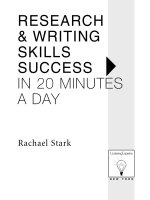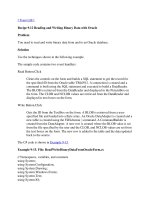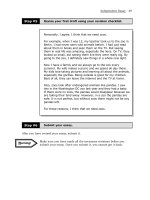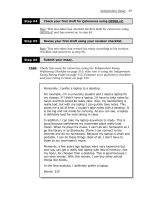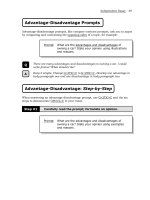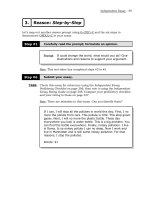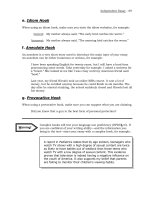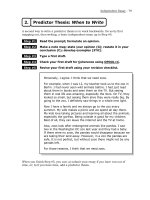Tài liệu RESEARCH AND WRITING SKILLS SUCCESS PART 8 pdf
Bạn đang xem bản rút gọn của tài liệu. Xem và tải ngay bản đầy đủ của tài liệu tại đây (80.23 KB, 7 trang )
1.
an official from the EPA (Environmental
Protection Agency)
2.
a local politician or local elected repre-
sentative
3.
an informed citizen
4.
the local Department of Conservation
and Water Protection
5.
an informed scientist or biologist
6.
a member of a local civic group
Materials for a Formal
Interview
Most individuals, no matter how hectic their
work schedules are, love to talk about what
they know and do best. However, it is impor-
tant to be prepared with the right equipment
and questions before you interview anyone.
For any interview, you will need:
■
a small, hand-held tape recorder (with an
extra set of batteries)
■
a blank tape
■
a note pad
■
two writing utensils
Most people do not object to having a
tape recorder record their conversation, but it
is always polite to ask beforehand if a tape
recorder is acceptable. There are individuals
who prefer not to be recorded or feel that the
presence of a tape recorder makes them nerv-
ous. Always remember to pack extra batteries
just in case your tape recorder runs out of
power, and always bring along a pad to take
notes throughout the interview—even if you
have a tape recorder playing. This allows you
to have a backup in case there is some mal-
function with your tape recorder, and taking
notes helps you to pay better attention as the
interview is progressing. In addition, always
bring along more than one pen or pencil.
Questioning Your
Interviewee
Before you proceed with your interview, make
a list of five relevant questions so that you
begin your interview with a focus. Normally,
people enjoy speaking and often wander off
the topic. While their information is often
interesting, your questions help the intervie-
wee stay focused on the topic at hand. Let’s say
that you are interviewing the first name on
your list—an official from the Environmental
Protection Agency. Your five questions should
be general enough to cover all the relevant
information while also containing specific
questions that might apply to your thesis. A list
of preliminary questions might look some-
thing like this:
1.
Can you briefly describe your title, job,
and your daily responsibilities?
2.
What role do you and the
Environmental Protection Agency play
in water conservation (particularly in
your local neighborhood)?
3.
Have you had any direct contact with
the problem of water pollution?
4.
What types of findings and data have
you and your agency collected from
examining the local water?
–
INTERVIEWING PRIMARY SOURCES
–
36
5.
What conclusions or summaries have
you made about water conservation,
water pollution, or water resources?
Remember that your questions should
always serve as a jumping off point—a prompt
for individuals to speak about what they know.
Do not overwhelm your interviewee with too
many questions—usually five questions are all
you need to obtain a wealth of information.
Other Ways of Locating Key
Individuals
What if you are not researching a current topic
or one that is readily accessible to you? In
other words, you may not know of any indi-
viduals whom you can contact directly. Don’t
worry. Let’s go back to the topic of President
John F. Kennedy. Most likely, you do not have
contact with the Kennedy family, and even if
you did, members of the family might not
want to speak about such a sensitive or delicate
subject. Are there other people or other pri-
mary sources you could turn to for unique
information? There are always other places to
check for gathering primary source informa-
tion. Below is a list of places to search for addi-
tional contacts that are open and available to
the general public:
1.
The Internet or any website devoted to
your topic. Just type your topic into one
of the broad search engines mentioned
in the previous chapter—this should
yield a list of additional contacts and
other individuals whom you can contact
directly for more information.
2.
Historical and cultural societies. Often,
they have staff who are experts in their
particular fields and can provide you
with professional information.
3.
Authors who have written about your
topic. Consult your books for their pub-
lishing company. You can usually call the
publishing company directly, ask for a
publicist, and inquire how to get in
touch with a specific author.
4.
Universities. Most universities have pro-
fessors who have spent their careers
researching particular subject areas and
are experts in their field.
If these places still do not yield experts or
professionals whom you can interview, you
can always check your local, national, or even
an international phone book to look up any
societies, museums, cultural institutions, and
perhaps, even private phone numbers of
potential primary source individuals. Even if a
living family member of President John F.
Kennedy is not available for information, per-
haps a famous biographer or professor would
be willing to speak about the topic. There may
also be a special historical association or website
devoted chiefly to his presidency.
–
INTERVIEWING PRIMARY SOURCES
–
37
Summary
Interviewing people who are directly connect-
ed (either through professional experience or
by relation) to your topic and subject area can
produce fascinating and unique information.
Remember, before you interview anyone, draw
up a list of five potential candidates whom you
can contact. Write out your preliminary ques-
tions beforehand, come prepared with all your
materials, and if you can’t find anyone in per-
son, use the resources of the Internet and the
institutions around you for additional experts.
–
INTERVIEWING PRIMARY SOURCES
–
38
LESSON
39
LESSON
B
efore you begin to take down any notes, make sure that you are well-equipped before-
hand so that you can make the best use of your reading and library time. Be sure to come
to the library with:
■
a highlighter (to highlight important material on your note cards)
■
a pencil (to make a light dot or mark relevant pages you need to read)
■
your note card holder (to keep your cards in)
■
lined index cards (to write your notes on)
■
tabbed index card dividers (with the letters of the alphabet, A-Z—to arrange by your subject
heading)
LESSON
Notetaking
LESSON SUMMARY
Now that you have collected more than enough books, articles,
magazines, and websites devoted to your topic how do you
record all this information in one place? More importantly, how do
you read complex material, sift through it, and take the most
important elements out of it for your work? This lesson will discuss
how to read your information critically and take notes from it in the
most efficient and time saving manner.
7
–
NOTETAKING
–
40
■
your pocket folder (in case there is a large
page or material that you need to copy
from the original book)
■
one index card for each book you use that
includes the book’s title, author, publisher,
and publication date
How to Use Index Cards
Often, you will not be able to take out a specif-
ic book. What if there is information in that
reference book that you desperately need?
Maybe you don’t want to spend ten or twenty
dollars to copy every page of information.
How do you walk away with the most impor-
tant information a book has to offer without
taking the book home from the library? Each
index card should function for you like a minia-
ture photocopy of that book. In other words, if
you suddenly threw all your index cards up in
the air and they came down again, you would
be able to pick up any of those index cards and
get precise, reliable information from it. To do
this, here are a few helpful hints. Every single
note card should contain:
1.
The title of the book you are reading
(upper right hand corner of your index
card)
2.
The author of the book you are reading
(upper right hand corner beneath the
title)
3.
The number of that index card itself
(number your index cards chronologi-
cally in the order you have used them in
the upper left hand corner, beginning
with 1.)
4.
A subject heading (put this in the center
of the note card)
5.
One or two direct quotations or para-
phrased sentences from the book you are
reading
6.
The page number of the book from
which you have taken the material
The Value of Note Cards
If you use this procedure, every single note
card will serve as a precise, miniature replica of
the book. In other words, by keeping note
cards, you will automatically have an instant,
accessible record of:
1.
What book you are referring to
2.
The author you are consulting
3.
The number of each note card
4.
How many note cards you took on a
particular book
5.
How valuable each source was (based on
the number of note cards taken)
6.
A specific subject or topic heading
(which will help you group your cards)
7.
A precise page number for citations and
footnotes
While this process might seem slow and
not make much sense in the beginning, it will
save you time later when you sit down to write
your paper. Instead of flipping back and forth
between notebook pages or sitting at the
library in front of half a dozen opened books,
scribbling notes and consulting various books
in a pile, you now have your material readily
accessible in an ordered, organized system.
